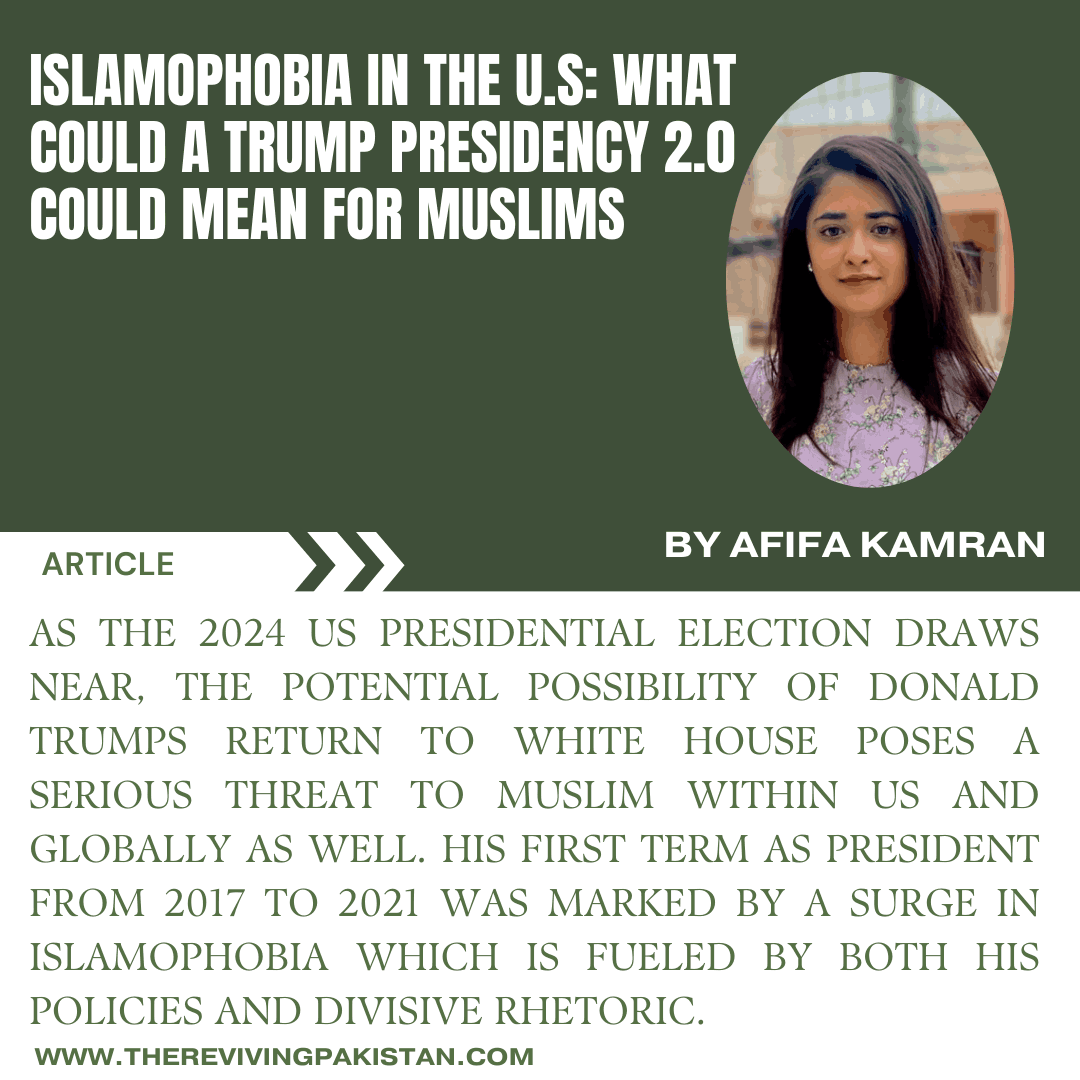About the Author(s)

Afifa Kamran
Author is a student of International Relations (IR) at UCP, dedicated to research and unafraid to voice her concerns. She seeks to challenge oppressive systems and share fresh perspectives through her writing.
As the 2024 US presidential election draws near, the potential possibility of Donald Trump’s return to White House poses a serious threat to Muslim within US and globally as well. His first term as president from 2017 to 2021 was marked by a surge in Islamophobia which is fueled by both his policies and divisive rhetoric. Islamophobia, a toxic blend of fear, hatred, and prejudice against Islam and Muslims has been festering in the West for decades. The 9/11 attacks in the US ignited a firestorm of misconceptions and xenophobia, which Western media and politicians have shamelessly exploited. By perpetuating stereotypes that equate Muslims with terrorism and extremism, they’ve created a climate of suspicion and hostility. The so-called ‘War on Terror’ and sensationalized media coverage of Islamist violence have only reinforced these harmful tropes, portraying Muslims as a threat to national security.
The Poisonous Legacy of Trump’s Islamophobia.
Donald Trump’s presidency was built on a foundation of fear, with Islamophobia being a cornerstone of his legacy. The Muslim Ban, one of his earliest and most contentious policies, institutionalized discrimination against Muslims, barring citizens from several predominantly Muslim countries from entering the US. Despite legal challenges and public outcry, Trump’s administration successfully pushed the ban through, embedding Islamophobia in US immigration policy. Throughout his presidency, Trump’s rhetoric perpetuated the harmful narrative that Muslims pose a security threat, using loaded terms like ‘radical Islamic terrorism’ that blurred the lines between Islam and extremism. This toxic rhetoric fueled a surge in hate crimes against Muslim communities, with anti-Muslim hate crimes rising by 15% in Trump’s first year alone, according to FBI data. By normalizing Islamophobic discourse at the highest levels of government, Trump created a cultural climate in which Muslims were demonized and Islam was equated with violence.
What Does a Second Trump Presidency Mean for the Future of American Muslims?
If Donald Trump wins the 2024 election, American Muslims face the revival of discriminatory policies, heightened surveillance, and emboldened bigotry. A reinstated or expanded Muslim Ban could isolate Muslims further, adding more countries to the list and widening the rift between the US and the Muslim world. But that’s not all a second Trump administration may also:
- Revive and intensify the controversial Countering Violent Extremism (CVE) program, which disproportionately targets Muslim communities
- Increase surveillance and profiling of Muslims under the guise of national security
- Empower far-right, white nationalist groups that promote anti-Muslim ideologies, leading to more violent attacks, hate crimes, and marginalization of Muslim communities
The consequences of another Trump presidency are dire. Muslims in America face the very real possibility of being singled out, scrutinized, and persecuted solely because of their faith.
The Global Consequences of Trump’s Islamophobia.
Trump victory in 2024 would have far-reaching consequences beyond US borders, exacerbating Islamophobia in regions already grappling with this toxic phenomenon. In Europe, his leadership would embolden far-right movements, providing a blueprint for populist leaders to advance their anti-Muslim agendas, leading to more restrictive policies and social unrest. In India, Trump’s tacit approval of Narendra Modi’s Hindutva ideology would further marginalize the country’s 200 million Muslims, with little fear of international condemnation. In the Middle East, Trump’s transactional foreign policy would continue to prioritize arms deals over human rights, allowing Islamophobic abuses to go unchecked in countries like Saudi Arabia, China, and Myanmar. A second Trump term would be a green light for global Islamophobia, with devastating consequences for Muslim communities worldwide. Will the international community stand idly by as Trump’s presidency fuels this growing menace?
The Silence of Complicity: Why Muslim can’t count on the International Community?
As the world braces for a potential second Trump term, Muslims worldwide are bracing for impact. But they should not be looking to the international community for support. History has shown that global powers like the UN and EU will likely turn a blind eye to Trump’s Islamophobic agenda, just as they did during his first term. Despite widespread condemnation from civil society and human rights groups, these institutions have consistently prioritized political and economic alliances over human rights.
The Muslim Ban, hate crimes, and far-right anti-Muslim policies all met with silence or weak statements from global leaders. It’s a stark reminder that Muslims are on their own in the fight against Islamophobia. Even Muslim-majority countries have remained passive, prioritizing strategic relations with the US over advocating for Muslim rights.
The reality is, Muslims can’t count on self-proclaimed champions of democracy and human rights to defend them. Collective action from Muslim-majority countries and communities is the only way to combat rising Islamophobia. The international community’s silence isn’t just complicity – it’s a betrayal of their values. Now more than ever, a united front is needed to combat Islamophobia and ensure that the rights and dignity of Muslims are protected globally.


1 comment
Afifa Your Each An Every Word Just Melting My Heart As You Are Spitting Bitter Facts
Comments are closed.